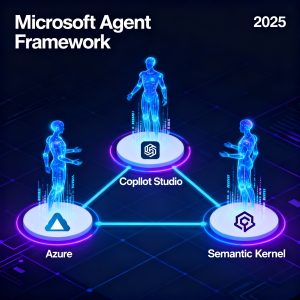DevOps in 2025 has evolved beyond toolchains and automation scripts. It’s now centered on building resilient, intelligent platforms that balance speed with governance. Organizations no longer prioritize tools-first approaches; instead, they demand systems that enable rapid delivery while maintaining compliance, security, and observability at scale.
Artificial intelligence is no longer a futuristic add-on—it’s embedded into daily workflows. From generating Kubernetes manifests to detecting anomalies in real-time monitoring dashboards, AI accelerates operations and reduces human error. The expectations from modern DevOps professionals have expanded significantly:
- Production fundamentals—Linux, networking, shell scripting, and Git—are now baseline requirements.
- Cloud-native expertise—containers, Kubernetes, service meshes, and Gateway API—are essential.
- Infrastructure as Code (IaC) and GitOps ensure changes are repeatable, auditable, and production-safe.
- Security is shifting left, with policy-as-code, SBOMs, and supply chain protection now often AI-assisted.
- Observability leverages AI-driven insights across metrics, logs, and traces to predict issues before outages occur.
- Platform Engineering delivers golden paths through Internal Developer Platforms (IDPs), increasingly augmented with AI-powered assistants.
This guide maps a clear progression from foundational knowledge to advanced implementation—linking skills to hands-on courses, labs, and real-world projects. Designed for 2025, it’s built for practitioners ready to move beyond passive learning and start shipping production-grade systems.
How to Navigate This DevOps Roadmap
Readers can approach this guide in two ways: by starting level (Beginner to Pro) or by career track—DevOps Engineer, Site Reliability Engineer (SRE), Platform Engineer, or Cloud Developer.
Each path integrates KodeKloud’s hands-on labs, KodeKloud Engineer (KKE) challenges, and AI-assisted learning tools to reinforce concepts through practice. Key checklists and assessment rubrics are embedded throughout to help learners measure progress and validate mastery.
The goal is simple: transition from “I watched a tutorial” to “I built and shipped a system.”
Core Skill Domains for 2025 DevOps
IT Foundations: The Bedrock of Modern Systems
Every cloud-native stack rests on a foundation of interconnected layers. Understanding these layers—from hardware to data—is critical.
At the base lies computer architecture: CPUs, memory, and storage executing instructions. Above it, the operating system manages resources, schedules processes, and enforces permissions. Networking extends this reach, enabling communication via IP, routing, and DNS.
Virtualization and containers allow efficient resource sharing and workload isolation. Mathematics for computing provides the logic and probability frameworks behind algorithms and system design. Finally, databases bring structure to data, enabling reliable access and querying.
Mastering this stack—from hardware to OS, networking, virtualization, math, and data—forms the essential baseline for all advanced DevOps work.
KodeKloud’s IT Foundations path offers beginner-friendly courses with guided labs in:
- Computer Architecture
- Networks and Communications
- Virtualization and Containers
- Operating Systems and Applications
- Mathematics for Computing
- Database Fundamentals (coming soon)
Linux & Networking: Command-Line Mastery
With foundational concepts in place, the next step is direct system interaction. Linux powers most production environments, requiring proficiency in filesystem navigation, user management, permissions, and service control.
These skills extend into networking, where understanding IP addresses, ports, firewalls, and DNS is essential for configuring connectivity and diagnosing distributed system issues.
Together, Linux and networking enable engineers to manage hosts and trace problems across complex environments.
KodeKloud’s practical courses include:
- Linux for Beginners
- Linux Shell Scripting
- Linux Challenges
Git & Collaboration: Enabling Team Velocity
As systems grow, so does the need for structured collaboration. Git provides version control, allowing teams to track changes, roll back errors, and manage code safely.
Workflows like branching, pull requests, and rebasing enable parallel development without conflicts. Strategies such as trunk-based development and Gitflow ensure smooth integration into shared repositories—forming the backbone of CI/CD automation.
KodeKloud’s Git for Beginners course combines theory with hands-on labs to teach real-world collaboration patterns.
Containers with Docker: Consistent Application Packaging
Once code is under version control, the challenge becomes consistent execution across environments. Docker solves this by packaging applications with dependencies into isolated containers.
Key skills include:
- Writing optimized Dockerfiles
- Using multi-stage builds to reduce image size
- Running multi-service apps with Docker Compose
- Adding health checks and vulnerability scans
These practices bridge development and deployment, preparing applications for orchestration at scale.
KodeKloud’s Docker for Absolute Beginners course offers step-by-step labs to build container expertise.
Kubernetes Core: Orchestration at Scale
When containers must run reliably across clusters, Kubernetes provides the orchestration layer. It begins with Pods—the smallest deployable units—and extends to Deployments for rolling updates and Services for stable networking.
Scheduling ensures efficient workload placement, while resource requests and limits prevent cluster overloads. Features like horizontal pod autoscaling and blue-green deployments enable zero-downtime updates and responsive scaling.
Industry-recognized certifications validate these skills:
- CKAD (Certified Kubernetes Application Developer)
- CKA (Certified Kubernetes Administrator)
- CKS (Certified Kubernetes Security Specialist)
KodeKloud’s structured Kubernetes courses—complete with real-environment labs—prepare learners for these exams and real-world operations.
Kubernetes Security: Protecting the Cluster
As workloads scale, security becomes non-negotiable. Role-Based Access Control (RBAC) restricts user and service account permissions. NetworkPolicies limit traffic between workloads, reducing attack surfaces.
Pod Security Standards prevent risky container configurations, while admission controllers enforce policies before resources are applied.
Together, these controls create a secure, compliant environment where only approved, safe deployments reach production.
KodeKloud’s CKS and KCSA certification courses provide hands-on enforcement labs to build these defenses.
Service Networking: Modern Traffic Management
Reliable delivery depends on intelligent traffic routing. While Kubernetes Services handle basic connectivity, Ingress manages external access. The Gateway API offers a more flexible, standardized model for scalable traffic management.
TLS encryption and DNS-based service discovery ensure secure, consistent communication across environments.
KodeKloud’s Kubernetes Networking Deep Dive, Istio Service Mesh, and AWS EKS courses provide practical exposure to these modern patterns.
CI/CD: Automating the Delivery Pipeline
Continuous Integration and Continuous Delivery (CI/CD) ensure changes flow smoothly into production. CI validates every commit with automated builds and tests. CD automates artifact promotion through staging and production.
Pipelines integrate security scans, artifact signing, and approval gates to maintain quality. The result: repeatable, predictable deployments that reduce downtime and increase release confidence.
KodeKloud’s labs cover:
- Jenkins
- GitHub Actions
- GitOps tools
Infrastructure as Code (IaC): Declarative Environments
Manual infrastructure management doesn’t scale. IaC solves this by defining networks, servers, and clusters as code.
Using tools like Terraform and Ansible, engineers create reusable, version-controlled modules. Remote state and workspaces enable multi-environment management, while policy enforcement ensures compliance.
KodeKloud’s Terraform for Beginners and Ansible for Beginners courses include real-cloud labs for hands-on practice.
Configuration & Packaging: Managing Kubernetes Deployments
As deployments grow, managing configurations across environments becomes complex. Helm templates Kubernetes manifests with environment-specific values. Kustomize layers configuration changes without duplication.
Together, they enable a single source of truth while supporting dev, staging, and production variations.
KodeKloud integrates Helm and Kustomize modules into its Kubernetes courses for real-world practice.
Observability: Seeing Systems in Real Time
Observability ensures systems are visible, measurable, and maintainable. Prometheus collects metrics, Loki aggregates logs, and tracing maps requests across services.
SLIs define what to measure; SLOs set reliability targets. Grafana dashboards visualize data, while alerts notify teams of threshold breaches.
KodeKloud’s observability courses—covering Prometheus, Grafana Loki, and the EFK Stack—include SRE-style labs for incident response and monitoring setup.
Platform Engineering: Building Developer Enablement Systems
As organizations scale, the focus shifts from running workloads to enabling teams. Platform Engineering builds Internal Developer Platforms (IDPs) with standardized templates, pipelines, and services.
GitOps keeps platforms declarative and traceable. Policy-as-code enforces compliance automatically. The goal: paved paths that accelerate development while maintaining governance.
KodeKloud’s courses in Backstage, ArgoCD, and FluxCD teach how to build and manage these platforms.
Cloud Skills: AWS, GCP, Azure
Modern DevOps runs in the cloud. IAM controls access; VPCs manage networking. Managed Kubernetes services—EKS, GKE, AKS—simplify operations but require knowledge of scaling, load balancing, and integrations.
Cost management ensures sustainable growth.
KodeKloud’s cloud courses cover:
- AWS Cloud Practitioner
- Microsoft Azure Administrator (AZ-104)
- GCP Cloud Digital Leader
All include real-infrastructure labs.
AI in DevOps: The 2025 Multiplier
AI is now a core enabler across DevOps workflows:
- Copilots generate YAML, Terraform, and scripts, reducing repetitive work.
- Anomaly detection identifies issues in logs and metrics before they escalate.
- AI-powered policy enforcement blocks insecure or non-compliant changes in CI/CD.
KodeKloud’s AI-focused modules include:
- Prompt Engineering 101
- LangChain
- Fundamentals of MLOps
- AWS Certified AI Practitioner
- Microsoft Azure AI Fundamentals (AI-900)
These courses teach how to integrate AI into real DevOps practices.
Choose Your Career Track
Track A: DevOps Engineer (Delivery-First)
Goal: Ship features quickly and safely using CI/CD, IaC, and Kubernetes.
Path (12–16 weeks):
Linux & Git → Docker → Kubernetes → CI/CD → IaC → GitOps → Observability → Security
Milestone Project:
Build a CI/CD pipeline that:
- Builds, tests, scans, and signs container images
- Deploys via GitOps (Argo CD)
- Implements HPA and SLO-based alerts
- Includes an architecture diagram in the README
Track B: Site Reliability Engineer (Reliability-First)
Goal: Ensure services are available, fast, and cost-efficient.
Path (12–20 weeks):
Linux → Networking → Kubernetes → Observability → SRE Practices → Incident Response → Cost Management
Milestone Project:
Set up reliability for a microservice:
- Define SLIs/SLOs and Grafana dashboards
- Configure alerts and synthetic checks
- Run a chaos experiment
- Add autoscaling and PodDisruptionBudgets
Track C: Platform Engineer (Golden-Path-First)
Goal: Build an internal platform developers love and compliance trusts.
Path (16–24 weeks):
Kubernetes → IaC → GitOps → Helm/Kustomize → Backstage → Policy-as-Code → Security → Cost Guardrails
Milestone Project:
Create a “paved road” platform:
- Bootstrap cluster with GitOps
- Provide repo templates
- Add Backstage scaffolder templates
- Enforce namespace and image policies
Track D: Cloud-Dev (Full-Stack Meets Infra)
Goal: Build and operate apps with strong infrastructure intuition.
Path (12–18 weeks):
Docker → Kubernetes → CI/CD → IaC → Observability → Security → Cloud Services
Milestone Project:
Deploy a real-world app:
- Run stateless and stateful components
- Use a database operator with backups
- Package with Helm
- Set up rollout strategy and SLO alerts
AI: The Multiplier Skill for Every Track
Regardless of path—DevOps, SRE, Platform Engineer, or Cloud-Dev—AI is now essential in 2025.
It doesn’t replace core skills; it enhances them. AI copilots speed up YAML and Terraform writing. AI-driven observability surfaces anomalies faster. AI in security flags supply chain risks automatically.
Recommended AI courses:
- MCP (Model Context Protocol)
- K8sGPT: AI-Driven Kubernetes Engineering
- Mastering Generative AI with OpenAI
- AI-Assisted Development
Think of AI as your force multiplier—making you faster, sharper, and more reliable across all domains.
Why KodeKloud Works
- Hands-on, lab-first learning: Break and fix real environments.
- KKE (KodeKloud Engineer): Daily scenario-based tasks simulating production incidents.
- KodeKloud Notes: Concise revision guides for every course.
- Up-to-date content: Covers Gateway API, dynamic provisioning, Helm/Kustomize, GitOps, and Backstage.
- Beginner to Pro progression: Courses ladder up with realistic projects.
- Exclusive AI Learning Path: Integrates AI into every DevOps workflow—from config generation to anomaly detection.
Read more such articles from our Newsletter here.



